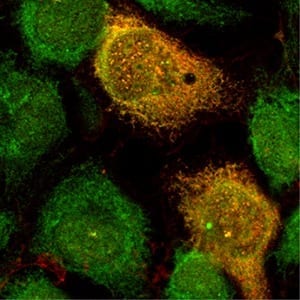
Infected with encephalomyocarditis virus, human cells dial up immune defenses, especially the interferon system. Many of this system’s components, including some newly discovered by researchers at Washington University School of Medicine in St. Louis, converge in cells that harbor the virus and work to interfere with viral replication.
Findings aid antiviral drug discovery
Many viral infections, such as the common cold, cause mild illnesses that the body’s immune system eventually defeats. But when viruses cause severe disease, doctors have few options for effective treatment.
Studying mice with a variety of viral infections, scientists at Washington University School of Medicine in St. Louis have demonstrated a way to dial up the body’s innate immune defenses while simultaneously attacking a protein that many viruses rely on to replicate.
The findings, published Oct. 19 in Nature Immunology, reveal previously unknown weapons in the body’s antiviral immune arsenal and provide guidelines for designing drugs that could be effective against a broad range of viruses. The strategy involves enhancing the body’s interferon signaling system, long understood to be a vital part of antiviral defenses.
“We’ve discovered a new component of the interferon system,” said senior author Michael J. Holtzman, MD, the Selma and Herman Seldin Professor of Medicine. “It does something that other components don’t do, and it works on both sides of the fence: It dials up the body’s internal genes that fight viruses, and it attacks viral proteins directly.”
Holtzman and lead author Yong Zhang, PhD, an instructor in pulmonary medicine, suspect that the researchers’ one-two punch against the virus may explain the large difference in survival rates between control mice and mice genetically engineered to have increased signaling in their interferon systems.
When infected with encephalomyocarditis virus, which causes severe damage to vital organs including the brain, heart and pancreas, 97 percent of the genetically engineered mice survived, compared with none of the control mice. Even when the concentration of the injected virus was increased 100-fold, 82 percent of the genetically altered mice survived. And at 100-fold lower concentrations, all genetically engineered mice survived the infection, compared with only 25-28 percent of the control mice.
Holtzman pointed out that past research by other groups has shown that increasing the amount of interferon directly results in some improvements in fighting viruses, but not to the same extent as the current work. In addition, more modest improvements shown by other investigators usually are accompanied by autoimmune problems resulting from the chronically activated immune response. Despite the strong antiviral immune response seen in the new study, Holtzman and his colleagues reported no evidence of autoimmune disease in these mice.
Read more: Study reveals new, potent way to boost immunity and fight viruses
The Latest on: Antiviral immune response
[google_news title=”” keyword=”antiviral immune response” num_posts=”10″ blurb_length=”0″ show_thumb=”left”]
via Google News
The Latest on: Antiviral immune response
- Can Neosporin Protect You From Getting COVID-19?on April 26, 2024 at 11:19 am
A small study recently published in PNAS presents a similar, if lower-tech, idea. Coating the inside of the nose with the over-the-counter antibiotic ointment Neosporin seems to trigger an immune ...
- Common antibiotic Neosporin may shield against viral respiratory infectionson April 26, 2024 at 9:00 am
A study conducted first in mice and then in human volunteers suggests that a common antibiotic, neomycin, which is the main active ingredient in Neosporin, may help protect against viral respiratory ...
- Genetically modified mice reveal key players in immune defense against viruseson April 25, 2024 at 11:00 pm
Chemokines are signaling proteins that orchestrate the interaction of immune cells against pathogens and tumors.
- How Do Immune Cells Communicate To Fight Viruses?on April 24, 2024 at 5:00 pm
Our immune response to infections is critically controlled ... signal through which NK cells communicate directly with each other and coordinate their antiviral response. "The experimental strategy ...
- Increased viral load and weaker immune response tied to severe COVID-19 infection among elderly, reveals studyon April 23, 2024 at 9:15 pm
As the COVID-19 pandemic continues to affect people of all ages, a new study has delved into the reasons why older individuals face a higher risk of severe illness from the virus. The study ...
- Phage Therapies for Multidrug-Resistant Infections Should Consider Host Responseon April 23, 2024 at 11:00 am
Research has found that therapeutic phages can be detected by epithelial cells of the human respiratory tract and elicit an immune response. These findings suggest that human–host interactions should ...
- Common antibiotic may be helpful in fighting respiratory viral infectionson April 22, 2024 at 12:24 pm
Yale researchers say that nasal application of neomycin shows promise in the prevention and treatment of respiratory viral infections ...
- Can Your Immune System Be Rejuvenated? Yes, Says New Researchon April 19, 2024 at 11:01 am
As we age, the immune system begins to weaken. This leaves us exposed to dangerous infections. But a new study offers hope: we may soon be able to reverse the trend.
- Key protein regulates immune response to viruses in mammal cellson April 18, 2024 at 5:10 pm
Researchers have revealed the regulatory mechanism of a specific protein that plays a key role in balancing the immune response triggered by viral infections in mammal cells. These findings could help ...
- Severe COVID in older adults may be due to greater viral load, weaker immune responseon April 18, 2024 at 12:01 pm
Increased SARS-CoV-2 viral load, an impaired ability to clear the virus, and weaker immune and anti-inflammatory responses may be why older adults are at higher risk for severe COVID-19 and death than ...
via Bing News










